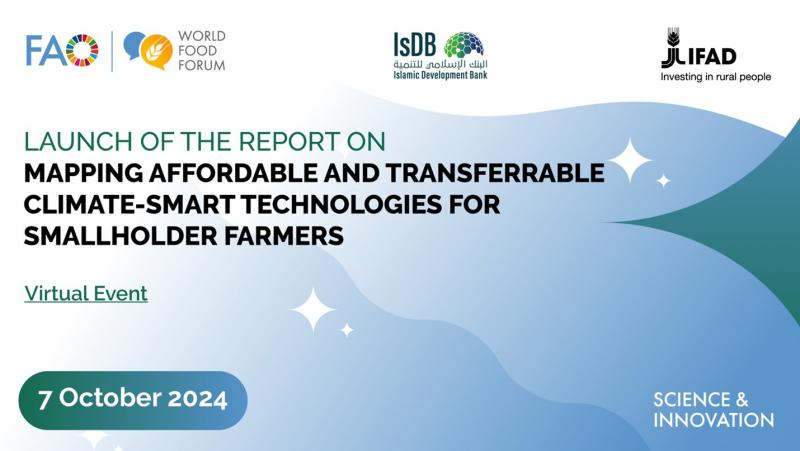
Launch of the Mapping Report on Affordable and Transferrable Climate-Smart Technologies for Smallholder Farmers
Background:
In response to the pressing need for innovative solutions to address food security challenges, a tripartite cooperation agreement between the Food and Agriculture Organisation (FAO), the Islamic Development Bank (IsDB) and the International Fund for Agricultural Development (IFAD) launched today the report on “Mapping of affordable and transferrable climate smart technologies for smallholder farmers".
This mapping targets 10 countries where smallholder farmers face different challenges, including Bangladesh, Brazil, Egypt, Jordan, Palestine, Morocco, Nigeria, Tajikistan, Tunisia, and Turkey.
The mapping effort focuses on six technology thematic areas critical to improving food security: 1) postharvest, reducing food loss and waste; 2) water management and water saving technologies in face of climate change; 3) sustainable pest control and crop management; 4) e-commerce and market access, 5) fintech; and 6) green energy for farmers agribusiness operations.
A screening criteria and three-level technology assessment methodology was developed focusing on affordable, reliable and easy-to-use green and environmentally friendly technologies that have potential to be leveraged and mainstreamed throughout the crop value chain for improving food security among smallholder farmers in selected countries. The assessment methodology was transformed into a Green and Climate Smart Technology Assessment Tool (GC-STAT), an Excel-based tool allowing adaptable evaluation scores and criteria weights. A total of 10 technology directories were created which include detailed information for 349 technologies. A total of 228 technologies were then screened and evaluated through a multi-level assessment which included 3276 criteria, resulting in the identification of a total of 120 highly viable technologies.
The Purpose:
The virtual launching event is designed to present the comprehensive mapping study conducted under the Tripartite Agreement between FAO, IsDB, IFAD with the aim to officially publish the report and disseminate the findings and recommendations of the study. The session will also include a round of feedback where experts and stakeholders from the targeted countries will provide input on some of the technologies highlighted in the report. It is expected that after the launch the GC-STAT decision support tool will be published as a digital public good that will support future assessment of technologies across the identified themes in any country.
Objectives:
- Officially release the key deliverables of the mapping study to relevant stakeholders globally.
- Discuss the potential applications and impacts of identified technologies in enhancing food security and climate resilience among smallholder farmers.
- Foster dialogue among policymakers, technology providers, and farming communities on scaling and adaptation of these technologies in different contexts.
Target Audience:
- Government officials from agriculture and technology ministries.
- Representatives from international development organizations.
- Selected Agricultural technology providers and startups.
- Researchers and academics in the fields of agriculture, technology, and climate change.
- Farmers' associations and cooperatives.
Expected outcome:
- Officially launching the report and making it available online on FAO, IsDB, IFAD websites.
- Developing a user-friendly interface for GC-STAT that allows for the creation of country profiles, addition of new technologies, and inclusion of new criteria, ensuring replicability and consistent methodology across different regions
- Continuous Engagement and stakeholder consultations (workshops and training programs) to validate and contextualize assessment results
- Way forward on how those technologies can be scaled up for the benefit of small-holder farmers.